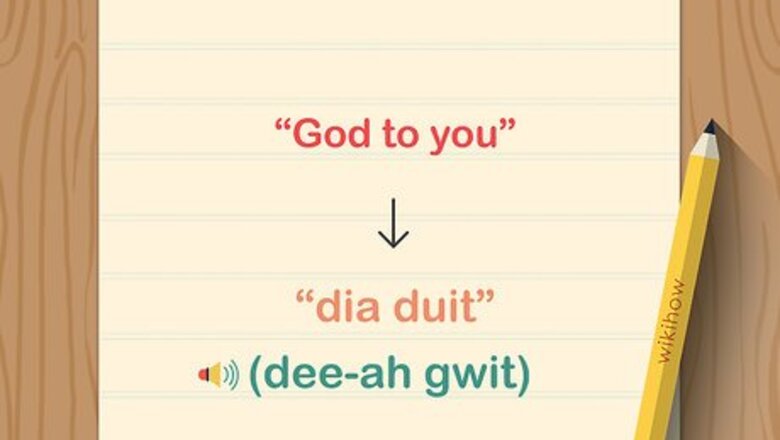
views
X
Research source
- “Dia duit” (dee-ah gwit), which literally means “may God be with you,” is the most common greeting among Irish nationals who speak Gaelic.
- “Mora duit" (mor-ah gwit), which translates to “morrow to you,” is a safe alternative if you want to avoid a religious greeting.
- Most Irish nationals speak English, although you may want to say “well” to greet folks in the Irish midlands, or “bout ye” to say hello in Belfast.
- If you get into a pinch, you can say “beagáinín” (byug-awn-een), which means “a little bit” to indicate that you don’t speak very much Gaelic.
Greeting Others in Irish Gaelic
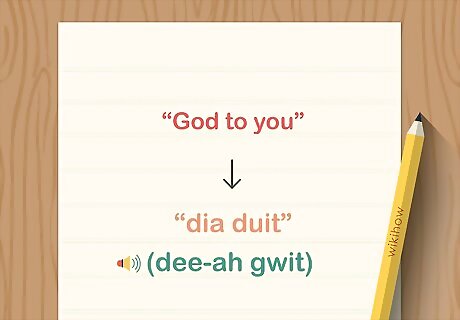
Say dia duit (dee-ah gwit) to greet people in any setting. This phrase literally means "God to you," also interpreted as "May God be with you." Amongst Irish speakers, this is the common way to say "hello" to anyone you meet. This phrase is used as a traditional greeting regardless of your religious beliefs or the religious beliefs of the person you're greeting. However, it's also a Christian blessing. If you're greeting several people at once, the duit becomes daoibh. You would say dia daoibh (dee-ah deev), which literally means "God to you all."Tip: Even though most people in Ireland also speak English, Irish speakers rarely greet each other with "hello" (spelled haló or heileo in Gaelic) except when answering the phone.
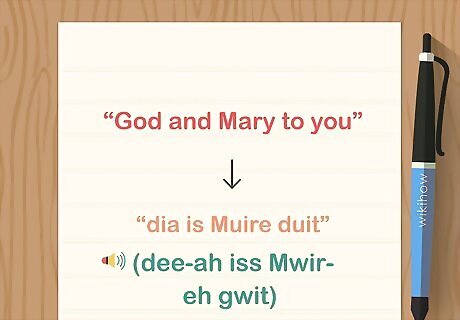
Respond to dia duit with dia is Muire duit. Rather than simply saying dia duit in return when someone says it to you, the more common response is dia is Muire duit (dee-ah iss Mwir-eh gwit). This phrase literally means "God and Mary to you." You typically wouldn't need a plural version of this phrase, because even if there were a group of people, your response would only be to the person who spoke.
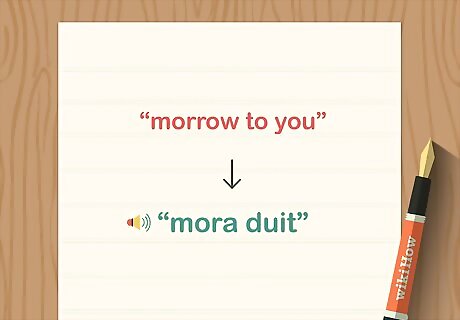
Try mora duit if you want to avoid a greeting with religious implications. If you're not Christian, you may not feel comfortable greeting people with what is essentially a Catholic blessing. Mora duit is an alternative that simply means "morrow to you." The word mora comes from Mór, the name of a Celtic goddess. However, this phrase has largely lost any religious or spiritual significance in modern times.
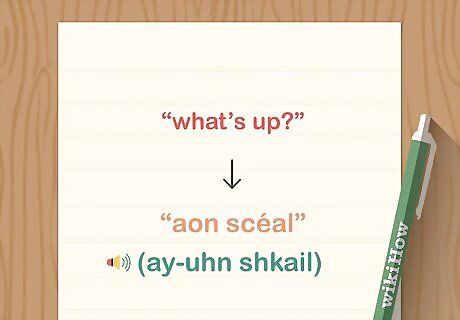
Use aon scéal (ay-uhn shkail) with people you know reasonably well. This phrase literally means "any story?" It's similar to saying "what's up?" in English, so it's appropriate with friends and acquaintances around your age. You might also use it with children or people significantly younger than you, even if you don't know them very well. This is considered a very informal, casual phrase. Even though Irish speakers don't tend to be as formal as many European cultures, it's still a good idea to avoid this phrase in serious or professional contexts.
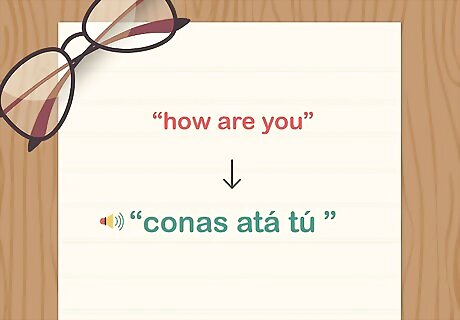
Ask conas atá tú after your initial greeting. In English, you typically would say "how are you" after greeting someone, and Irish is no different. To ask after someone's well-being in Irish, say conas atá tú. In the Western or Connaught Gaelic dialect, you would say cén chaoi a bhfuil tú. Although the pronunciation is different, it means the same thing as conas atá tú. The response to conas atá tú is tá me go maith (taw may guh maw), which means "I am well."
Using Regional Greetings
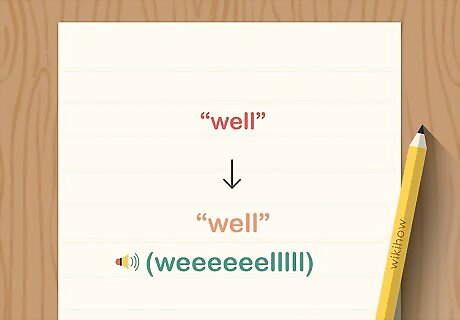
Use "well" as a greeting in the Irish midlands. This greeting is more common with people you know but can be used with anyone. However, you'd generally want to avoid using it with elders or people in a position of authority. It's usually drawn out long and slow, like "weeeeeelllll," and might be followed by the name of the person you're greeting. In Gaelic, this greeting is spelled "bhuel," but pronounced roughly the same as the English word "well."
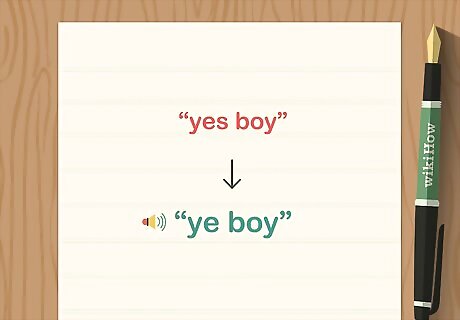
Try "ye boy" or "ye girl" in Ulster and Northern counties. "Ye boy" or "yes boy" is a common greeting among men in Northern Irish counties, while you may here "ye girl" among women. The origin of this phrase is unknown, but it is understood as a greeting. You may also hear "hup ye boy ye" or "hup ye girl ye."
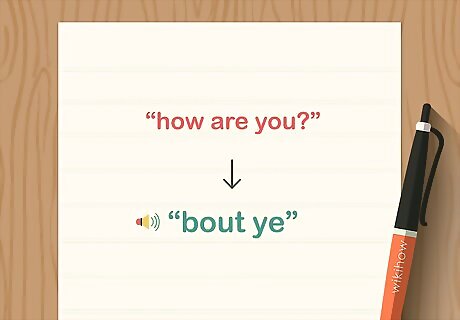
Say "'bout ye" in Belfast. "'Bout ye" is a shortened version of "how's about ye?" This question is typically used to ask how someone's doing, but it's also used as a greeting on its own. This greeting is most common in Belfast and Northern Ireland. From Dublin to Dursey Island, you'll likely hear "how ya," a phrase similar to "'bout ye." It has the same meaning, in that you're asking how someone's doing, but you're also greeting them at the same time.Tip: Although "top o' the mornin'" is a stereotypical Irish greeting, it hasn't been used in Ireland in over 100 years. If you use this greeting in the country or around Irish people, they may think you're making fun of them.
Adding Other Common Irish Expressions
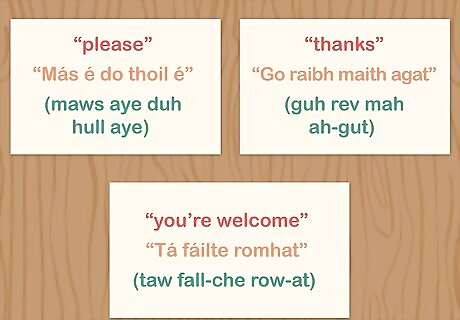
Include polite phrases to show respect and mind your manners. As in any language, respect and politeness are important when speaking Irish, especially if you're talking to someone older than you or in a position of authority. Some polite words and phrases to learn include: Más é do thoil é (maws aye duh hull aye): "please" (literally "if it is your will") Go raibh maith agat (guh rev mah ah-gut): "thanks" (literally "that there may good at you") Tá fáilte romhat (taw fall-che row-at): "you're welcome" (in response to thanks; literally "there is a welcome before you"). Tá fáilte romhat is also used as a greeting, particularly if you are welcoming someone into your home.Pronunciation Tip: The ch sound in Gaelic is a sound that doesn't exist in English. It's similar to the ch in the Scottish word "loch." If you can't pronounce this sound correctly, you can use a "k" sound and you'll likely still be understood.
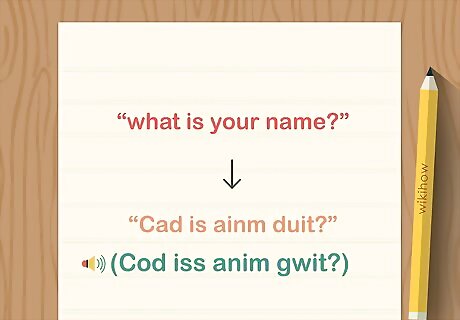
Introduce yourself if someone asks Cad is ainm duit? If you exchange greetings with someone and they ask Cad is ainm duit? (pronounced Cod iss anim gwit?), they are asking you what your name is. A literal translation of the question would be "What is the name to you?" To respond to this question, say your name followed by the phrase is ainm dom (iss anim dum). This means, literally, that your name "is the name to you," but a more accurate translation would be "My name is."
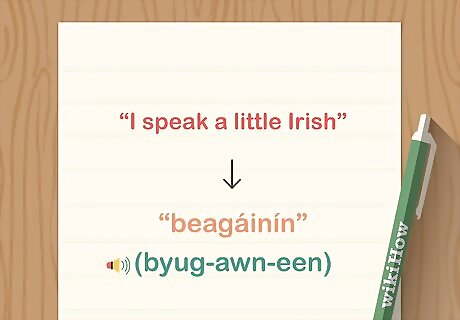
Use beagáinín (byug-awn-een) to let people know you only speak a little Irish. After you've introduced yourself, the person might ask you An bhfuil Gaeilge agat? (pronounced On will Gail-geh ah-gut?), which means "Do you speak Gaelic/Irish?" If you've only learned a few words in phrases, saying beagáinín lets them know you only speak "a little bit" of Irish. You can also say tá cúpla focal agam (taw koop-la fuk-al a-gum). A literal translation of this phrase would be "There is a couple of words at me," but like ''beagáinín, it means that you only speak a little Irish.
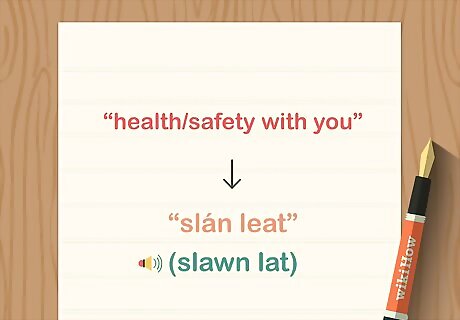
Say slán leat (slawn lat) when you part ways with someone. This phrase literally means "health/safety with you." However, among Irish speakers, it is used to say "goodbye." This phrase is suitable to use in any context. If you're talking to a friend who you expect to see later, you can also say slán go fóill (lawn guh foal). This phrase literally means "health (or safety) till later," but it is used in the same sense as you would say "see you later" in English.




















Comments
0 comment